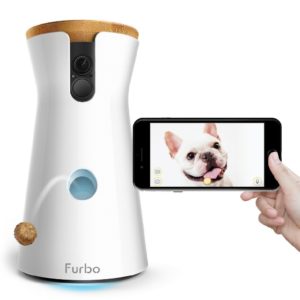Amazon is going to revoke my membership for sure.
First, I wrote to Jeff Bezos asking him why his Amazon logo looks like an erect penis, arching toward a vaginal “O” (I still await a response, Jeff).
Then I attempted to play provocateur on the Amazon website, which featured an absurd webcam that tosses a treat to your dog for, well, I’m not really sure. Maybe for not eating the cat? In the customer forum, I asked whether it was urine-proof. I got a half dozen earnest replies and the inevitable snarky one from a customer who said her dogs didn’t urinate on unintended targets. My response was “Oh, I don’t have a dog.”
Last week, in a self-published book that just hit shelves (order now, only 4.5 billion remaining!), I wrote a review in the customer feedback section (how is the writer allowed to review his/her own book?). Inspired by the president’s past of playing an anonymous publicist to promote himself, I gave the book a five star review and quoted a certain DJT as saying “Perhaps the greatest book since the Bible. It has the best words. Everyone says so.”
I know I shouldn’t press my luck, but I have another question for Jeff: Why is Alexa so stingy with compliments, while Google Home is so positive?
I discovered this quite by accident, as I was rushing to get ready for dinner. As I grabbed a jacket from the office, I decided to ask Alexa how I looked. The response was tepid, if not a passive-aggressive criticism.
After an awkward pause, this is what she said: “I’m sure you look just great.”
THAT’s the best you could do, Alexa? Not even a little white lie for courtesy’s sake? Why not just say “You look like you won that shirt at a state fair carnival.”
Mildly insulted, I sought a second opinion: the Google Home Mini I keep on the office desk, right next to the Alexa Dot. I asked it the same question, How do I look?
“Magnificent,” Google replied with nary a hesitation.
Now I was intrigued. I asked each about the other. Of her rival, Google said “Alexa has such a soothing voice. I like it.” Ask it again, you’ll get similar compliments. Once, she said, “I like I like Alexa’s cool blue light. Plus, we share an affinity for Star Wars.”
Ask Alexa if she knows Google Home, and you’ll get a curt “Only by reputation” in response.
It was an amusing test of A.I. etiquette. But that must have been an intense debate among software engineers at Amazon and Google; how friendly do you make Artificial Intelligence? How sarcastic, how sexual, how soothing? Repeat the “how do I look” question, and you’ll get the same difference in tenor. When Google finally told me I looked “ravishing,” I ended the experiment. I didn’t want to lead her on.
But it underscores what must be a real conundrum for designers. Google has clearly chosen the tack of a cyber Tony Robbins: supportive, positive, downright cheery. Amazon made Alexa a cyber Miss Manners, with all P’s and Q’s properly attended and all opinion straight down the non-controversial middle of the road.

Which is better is impossible to say, but this is not: Google is more daring, hands-down. When I asked Alexa “How should I end this story?”, it gave an “I don’t understand” error beep and shut down (which, I guess, is how a lot people end their stories).
When I asked Google the same question, I got an entirely different answer:
“Don’t be afraid to write, rewrite and rewrite again until your ending sounds natural, satisfactory and complete. The end.”
Wow, thank you A.I. You look magnificent, too.
The end.

